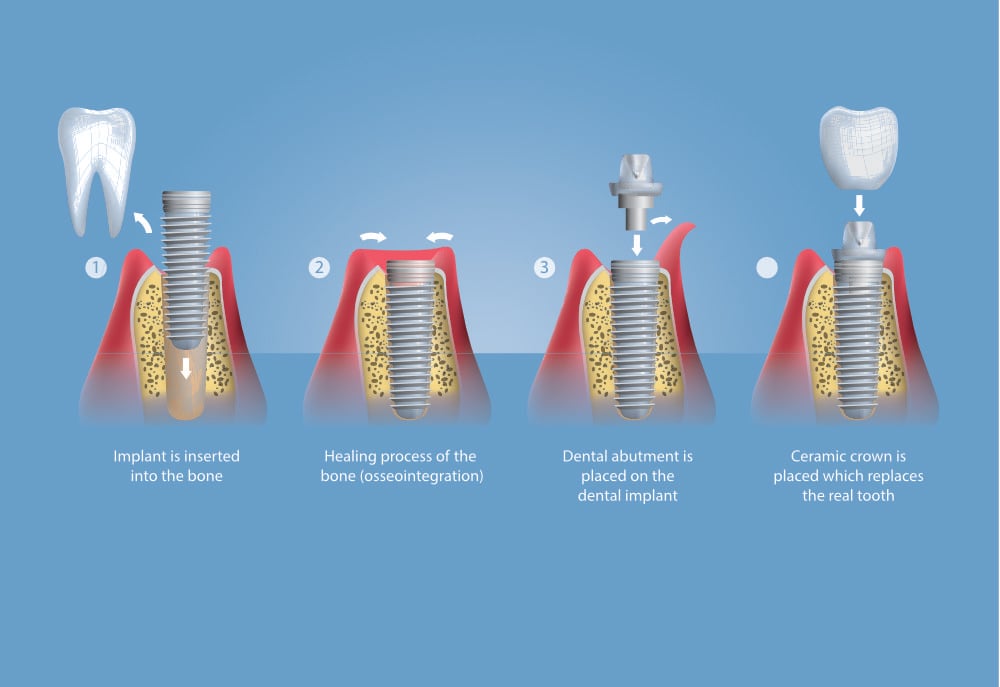
Millions of Americans lose one or more teeth for many reasons. The most common of these reasons are due to accidents, tooth decay, or periodontal disease.
Whether you are playing sports or you stumble and fall, accidents are a part of life. Yet, tooth decay and periodontal disease result from harmful mouth bacteria invading your teeth and gums. Bacteria attack your teeth and eat away at the enamel.
This leads to cavities, or holes, in your teeth. Once the cavity reaches the nerve-rich dental pulp in the center, there are few choices left to resolve the situation. One of those options is tooth removal.
Like tooth decay, mouth bacteria also cause periodontal disease but attack your gums. The disease progresses as the bacteria multiply and thrive. Your gums grow red and inflamed, sometimes with deep pockets. This leads to your once healthy teeth loosening in their sockets until tooth loss occurs.
A dental restoration can help you regain your bright, healthy smile. There are a few options for dental restorations including bridges and dentures. Dental implants is another option and one that is gaining in popularity. Here is some useful information should you consider dental implants.
What are dental implants?
Dental implants, or replacement tooth roots, are a great permanent option to replace one or more missing teeth.
Created out of strong titanium, dental implants are a long-lasting option for tooth replacement. Well-maintained dental implants are so sturdy that they can a last lifetime.
How many dental implants you need and what restoration purpose they will serve depends on how many missing teeth you have and the type of dental prosthetic you choose. A dental implant used alone receives a porcelain or acrylic crown, or replacement tooth.
Your dentist carefully matches the crown to the shade of the rest of your teeth for a more natural look. Yet, this isn’t the only use for an implant in tooth restoration.
Why might you need dental implants?
Dental implants also provide support for other types of dental restorations like fixed bridges and dentures. They do this by helping the fixed bridge or denture anchor in place.
There is no need to permanently alter otherwise healthy teeth on either side of your missing teeth to serve as anchors. Instead, dental implants provide an alternative way to secure your fixed bridge in place.
Fixed dentures are another dental restoration that utilizes the technology of dental implants. Forget the messy denture adhesives. With dental implants in place, there’s no need to worry about your dentures slipping or sliding and causing discomfort.
A few dental implants strategically placed provide a better, more secure way to hold your dentures in place.
What can I expect with a dental implant?
Dental implants are surgically fused to your jaw bone for the best possible fit. They look and feel more natural than other types of traditional dental restorations.
They also do not alter the appearance of your facial structure or your ability to enunciate words. Thus, dental implants are the closest form of dental restoration to your natural teeth.
Some forms of dental restorations require nightly removal, brushing, flossing, and even overnight soaking. That’s quite a routine. Caring for your dental implants is as easy as brushing your teeth for two minutes twice a day and flossing daily.
Can anyone get a dental implant?
Dental implants are not the perfect solution for everyone. A good candidate for dental implants depends on the health and structure of your gums and jawbone. Your gums should be free of periodontal disease to ensure the best outcome.
You must also have sufficient jaw bone structure to anchor the dental implant in place. This is something that Dr. Linger can discuss with you during your dental exam and consultation.
Depending on your specific needs, sometimes a bone graft is an option to build up the bone tissue needed to support an implant. But, remember, you must make the commitment to practice regular oral hygiene and have a willingness to follow-up for routine dental visits to ensure your smile lasts a lifetime.
Will dental insurance cover the cost of dental implants?
Insurance coverage is always a hot question for any dental service. The problem is that all dental insurance plans and coverages differ.
Some dental insurance plans will help cover a small percentage of the cost of dental implants while others will not. To determine your coverage, check with your dental insurance provider.
If your provider does not cover dental implants, do not fret. There is another option available to finance your dental implant. Dr. Linger understands the difference that a full, healthy smile can make as well as some of the challenges you face with dental insurance coverages.
That’s why our office is proud to offer you another solution to regain the smile you deserve. We offer an affordable financing solution called Lending Club Patient Solutions. This alternative financing option allows you a flexible way to regain your healthy smile.
To discuss whether dental implants are the right choice for you, click here to contact us today and schedule your consultation.



